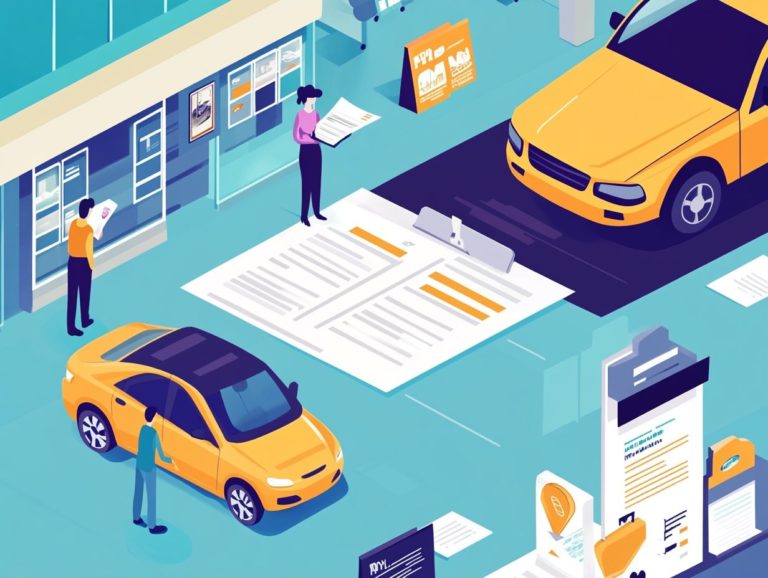The Hidden Costs of Car Financing
Navigating car financing can feel daunting, especially with hidden costs lurking around the corner. It s essential to understand the various types of financing and their true expenses. Explore alternatives like leasing or buying outright to make informed decisions.
This article breaks down the essential aspects of car financing, including interest rates, fees, and budgeting tips. By the end, you ll be well-equipped to minimize extra costs and negotiate better deals, ensuring your next car purchase aligns with your financial goals.
Contents
- Key Takeaways:
- Understanding Car Financing
- The True Cost of Car Financing
- Alternatives to Traditional Car Financing
- Tips for Minimizing Hidden Costs
- Frequently Asked Questions
- What are the hidden costs associated with car financing?
- How do interest rates impact the overall cost of financing a car?
- What are loan fees and how do they affect car financing?
- How does vehicle depreciation impact car financing?
- Do I have to pay sales tax on a financed car?
- Are there any ways to reduce the hidden costs of car financing?
Key Takeaways:

- Hidden fees and high interest rates can significantly impact the true cost of car financing, potentially adding thousands of dollars to the total amount paid.
- Leasing and other alternative financing options may offer lower monthly payments but can include unexpected fees, such as mileage limits and upfront charges.
- Proper research, budgeting, and negotiation can help you save money in the long run.
Understanding Car Financing
Understanding car financing is crucial for anyone aspiring to own a vehicle. It involves various elements, including loan payments, interest rates, and the overall financial responsibilities tied to car ownership.
In today’s automotive landscape, many individuals are sharing their experiences and insights on how to navigate the complexities of securing auto loans. Influencers on social media provide tips on keeping an eye on hidden costs and long-term commitments.
Types of Car Financing
Car financing presents several options, including traditional auto loans, leasing arrangements, and specialized deals for vehicles like the Chevy Tahoe. Each option carries its own unique details that can significantly impact your overall ownership costs.
When you opt for an auto loan, you’ll typically make monthly payments that will eventually grant you full ownership an enticing prospect if you enjoy keeping a vehicle for a long time. However, this route often comes with higher monthly payments and the inevitable weight of depreciation, or the reduction in a car’s value over time.
Leasing lets you drive a new vehicle every few years, usually with lower monthly payments. Yet, this comes at the cost of building no equity in the car by the end of the lease term, which can be a drawback if you re looking to create value.
By carefully evaluating these options, you can determine which financing method aligns best with your budget and lifestyle.
The True Cost of Car Financing
The true cost of car financing extends far beyond those initial monthly payments. It includes a range of hidden expenses, so understanding additional costs in car buying can substantially impact your overall financial picture.
Think about factors like interest rates, depreciation, and those extra monthly payments for insurance and registration that can sneak up on you. Make sure you consider all these factors to avoid unexpected costs!
Interest Rates and Hidden Fees

Interest rates and hidden fees can significantly reshape the landscape of auto loans, potentially adding thousands of dollars to the financial burden of car ownership, something resources like what you should know about car financing fees emphasize.
These rates depend on various factors, including your credit history, income stability, and the current economic climate. A solid credit score can unlock more favorable terms, whereas a less-than-stellar credit history might lead to steeper rates.
As a prospective car buyer, it’s crucial to stay alert to hidden fees like:
- Loan origination fees
- Prepayment penalties
- Tempting add-ons offered by dealerships
By grasping these elements, you can make informed decisions, potentially saving money and ensuring a smoother car-buying experience.
Take control of your car purchase today do your homework and negotiate like a pro!
Impact on Monthly Budget
The impact of car payments on your monthly budget can be quite substantial. This is especially true when you factor in the fluctuations of the automotive market and the lingering effects of the pandemic on consumer finance.
In today’s economic climate, it’s crucial to evaluate your overall financial landscape with care. You need to balance car payments against other fixed and variable expenses.
Make a list of your monthly expenses, like rent, utilities, groceries, and savings. One smart strategy is to allocate a specific percentage of your income toward transportation costs.
Ideally, this should not exceed 15% of your monthly earnings. Staying informed about interest rates and potential changes in insurance premiums can help you fine-tune your budget plans further.
By keeping an eye on these variables, you can navigate your financial responsibilities more effectively. This ensures you maintain a healthy balance.
Alternatives to Traditional Car Financing
When considering alternatives to traditional car financing, you have a wealth of options at your fingertips. Whether it’s leasing, purchasing a pre-owned vehicle, or exploring financing tailored for luxury cars, each choice presents unique advantages.
These alternatives cater to diverse consumer needs. It s important to weigh the pros and cons of each option before deciding.
Leasing vs. Buying
The decision to lease or buy a vehicle, like the Chevy Tahoe, requires careful thought. Consider the financial implications, personal preferences, and your long-term ownership goals.
This choice revolves around several key factors, including monthly payment amounts and maintenance responsibilities. You should also consider the potential value you own in the vehicle.
Leasing often presents lower monthly payments. This makes it an attractive option for those who prefer a new car every few years.
However, flexibility comes with mileage limits and the obligation to return the vehicle in good condition. Conversely, buying grants you the freedom of ownership.
You can customize and drive the vehicle however you wish. This option typically demands a larger initial investment and ongoing maintenance costs.
Grasping these trade-offs gives you the power to make an informed decision that aligns with your needs.
Other Financing Options

Along with traditional auto loans, you have access to various other financing options. These include online platforms and credit history-based solutions tailored to meet your unique needs.
These innovative alternatives offer greater flexibility when it comes to securing funding. For example, peer-to-peer lending platforms enable you to borrow directly from individuals.
These platforms often offer rates that outshine those of conventional banks. Alternative credit evaluations also consider factors like your payment history on utilities and rent.
This helps those with limited credit histories qualify for loans. This adaptability gives you the power to explore a range of solutions that align with your financial situation.
Ultimately, this expands your access to essential resources for purchasing or leasing a vehicle.
Tips for Minimizing Hidden Costs
Minimizing hidden costs associated with car financing can significantly alleviate the financial strain of car ownership. By employing effective negotiating tactics with dealerships, you can make a remarkable impact on your overall expenses.
Negotiating with Dealerships
Negotiating with dealerships is a crucial step in your car financing journey. This gives you the opportunity to lower interest rates and uncover any hidden fees that could impact your overall payments.
To navigate this intricate landscape effectively, arm yourself with thorough research and preparation. Before you even set foot on the lot, gather information about the vehicle’s market value.
Explore comparative financing options and check out the dealership s current promotions. During your discussions, don t hesitate to ask pointed questions about pricing, loan terms, and specific charges.
This will help clarify the deal significantly. Stay vigilant for common hidden fees, such as:
- Destination fees
- Documentation fees
- Extended warranties
By maintaining a confident and informed demeanor, you can maximize your chances of striking a highly favorable agreement. Start exploring your financing options today!
Budgeting for Hidden Costs
Don’t let hidden costs catch you off guard! Budgeting for these expenses is vital for responsible car ownership.
Make sure to include all financial elements like insurance, the decrease in value of your car, and vehicle registration in your plan.
By understanding various costs, you can prepare for expenses beyond just the purchase price. Maintenance and repair costs tend to add up quietly, especially as your vehicle gets older.
Fuel prices can also fluctuate dramatically each month. Setting aside a portion of your budget for unexpected repairs can be a game changer.
Don’t forget to account for taxes, inspection fees, and possible parking or toll expenses. This thorough approach is key to ensuring your financial future is secure.
Frequently Asked Questions

The hidden costs of car financing include interest rates, loan fees, vehicle depreciation, and sales tax. For a deeper insight into these factors, understanding the true cost of a new car can significantly increase your awareness of the total cost of purchasing a car.
How do interest rates impact the overall cost of financing a car?
Interest rates determine the amount of money you will pay each month for your car loan. A higher interest rate means a higher monthly payment and a higher total cost of financing.
What are loan fees and how do they affect car financing?
Loan fees are charges from the lender for processing and managing your car loan. These fees can include application fees, origination fees, and prepayment penalties, adding hundreds or even thousands of dollars to the total cost of car financing.
How does vehicle depreciation impact car financing?
Vehicle depreciation is the decrease in value of a car over time. The rate of depreciation varies depending on the make and model of the car, but it can significantly impact the total cost of car financing.
A car’s value can depreciate faster than you can pay off your loan, leaving you with negative equity, meaning you owe more on the loan than the car is worth.
Do I have to pay sales tax on a financed car?
Yes, sales tax is typically included in the total cost of car financing. The amount of sales tax you will pay depends on your state’s tax rate and the purchase price of the car.
Yes, you can reduce the hidden costs of car financing by negotiating a lower interest rate, choosing a shorter loan term, and avoiding unnecessary add-ons or extended warranties. Additionally, it’s important to be aware of the risks of long-term car loans when making your financing decisions.
It’s also important to research and compare loan offers from different lenders to find the best deal for your financial situation.
If you have more questions or need assistance, feel free to explore additional resources or reach out for help!






